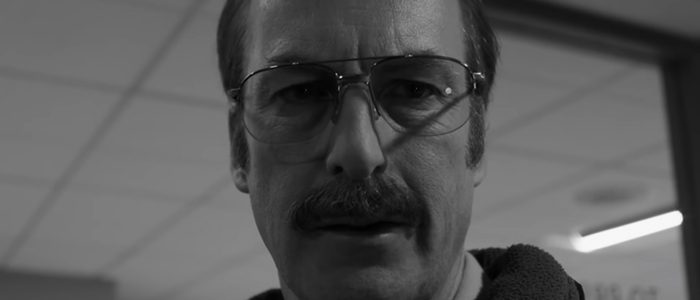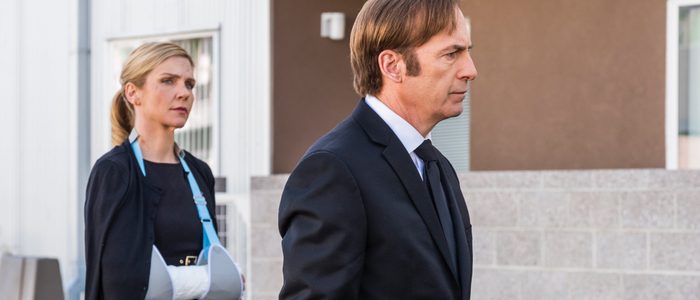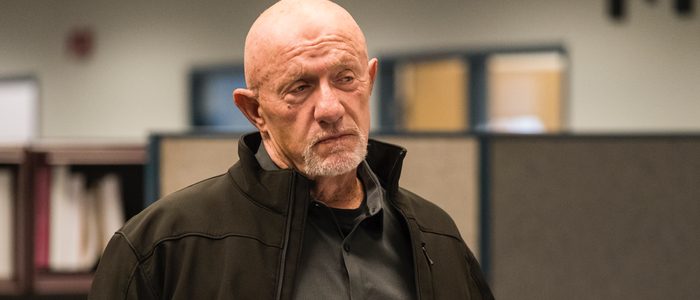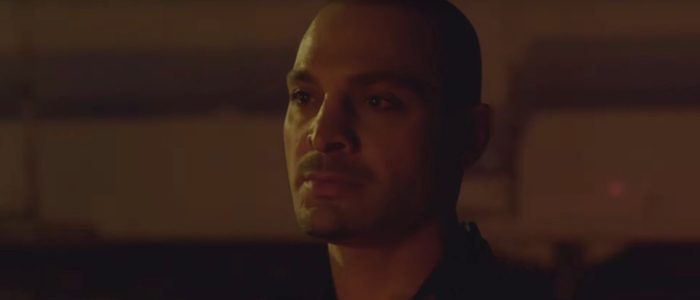‘Better Call Saul’ Finds Jimmy McGill About to Go Up in ‘Smoke’
Welcome to our weekly review-recaps of Better Call Saul season 4. Each week, we’ll delve deep into the Breaking Bad prequel series, with spoilers galore. This week kicks-off with the season 4 premiere, “Smoke.”
“Gene”
Every Better Call Saul season checks-in on the current whereabouts of the man formerly known as Jimmy McGill and Saul Goodman. These stylish black and white beginnings are almost always loaded with misery – a sense that Jimmy is being eternally punished for everything he did wrong. His old life is a distant memory, and now Jimmy lives as Gene, manager of a Cinnabon in Omaha.
When we checked-in with Gene last season, he fainted, and we were left wondering what happened to him. Season 4 provides an answer: nothing, really. At least, nothing medical. Gene was brought to the hospital, and the doctors couldn’t pinpoint a problem. This is good news – in theory. But of course, since Gene isn’t really Gene, he’s nervous about being so publicly exposed. The nervousness boils over into full-blown paranoia.
First, the hospital’s desk clerk has trouble locating Gene’s information based on the social security number he provided. Is his Gene’s phony documentation about to be discovered? Is his true identity about to be discovered? Has his time in hiding come to an end?
No. The clerk just entered the info wrong – typing a letter O instead of a 0. And yet…the paranoia persists. Gene hops into a cab, and immediately notices the cab driver has an Albuquerque Isotopes air freshener dangling from the rear-view mirror. Albuquerque is, of course, the place “Gene” ran away from, and he begins to panic. Once again, Bob Odenkirk shows us how he can do so much with so little. We can feel the paranoia seeping in; we’re just as anxious as he is. All from a few nervous glances and instances of heavy breathing.
Is this cab driver someone from back home sent to kill him? Or is it all just in his head? Not helping matters is the fact that the cab driver acts super creepy, shooting menacing glances into the rearview. It’s all too much, and Gene makes the cabbie let him out at a random spot, and then he stalks off into the night, trying to catch his breath.
Every Gene-based season-opener seems to set the tone for what’s to come, so what can we learn from this? Perhaps this is an indication that Better Call Saul season 4 will be all about things catching up to Jimmy McGill. Things he can’t outrun forever. Ultimately, this is part of the built-in brilliance of the show. We know where this is all eventually headed, thanks to Breaking Bad. But we really don’t know anything. Saul Goodman on Breaking Bad was something of a mystery – we only ever saw him at work in his gaudy office. His personal life was left off screen. So yes, we know that Jimmy will eventually end up hiding out in Omaha as a depressed, mustachioed Cinnabon manager. But the journey to get him there is still wholly unpredictable.
Jimmy
The first image we see as the episode starts in earnest is fire. Not an all-consuming raging fire, but flickering, floating embers that drift across the darkness. Season 3 ended with a miserable, weary, and possibly deranged Chuck McGill setting fire to his own house, and when these embers begin to fill the screen, the first thought is that we must be about to check-in on Chuck. But a curious thing happens – the tiny burning sparks drift not across Chuck’s house, but the apartment Jimmy Mcgill now shares with Kim Wexler.
This is like a dream, or an illusion. These burning points of light aren’t really here, in this room, drifting across Jimmy as he sleeps. And yet Better Call Saul is putting this image forward, like an omen; a prophecy of certain doom. Everything in Jimmy McGill’s life is in danger of going up in smoke.
But first: breakfast. Jimmy, unaware of what’s happened to his brother, sets about his morning ritual. He pours himself a bowl of cereal. He makes coffee. And he pursues the want-ads in the local paper. He’s still barred from practicing law for the time being, and rather than sit back and wait, Jimmy apparently wants to find an in-between job.
The morning’s idyllic nature shatters rather quickly. A call comes in from Howard, and Jimmy and Kim – who is still battered and bruised from her horrifying car accident last season – rush over to Chuck’s house. Or what’s left of Chuck’s house – which isn’t much more than a blackened husk. To underline how bad this is, Jimmy gets out of the car the exact minute the coroner’s van pulls away. There’s no room for misinterpretation here: Chuck is dead.
Things had not been ideal for the Brothers McGill. Last season, Jimmy humiliated Chuck in a court of law. Later, when he tried to earnestly make amends, Chuck cruelly told Jimmy: “you were never really that important to me.” Yet Chuck was – at least on the surface – “better.” He had apparently beaten his hypersensitivity to electricity, and was living a normal life again. But Jimmy now notices that all of the house’s electrical devices are piled-up in the backyard. Chuck had relapsed before setting fire to the house, and Jimmy can’t quite figure out why. He never articulates this, but the implication is clear: he thinks it might have been his fault.
The episode underlines Jimmy’s thinking by having him sit on the bench across from Chuck’s house. The same bench the two brothers both sat together on in the 9th episode of season one, after Chuck had accidentally stumbled out of the house and found he was physically fine and unaffected by any electricity coursing through the air.
From here, “Smoke” becomes about silence. It’s a curious way to kick-off the season, and further illustrates why Better Call Saul is so unique. It knows that silence makes people uncomfortable, especially on screen. And Jimmy spends a bulk of the episode saying very little. He’s near-catatonic at times, offering up only one-syllable responses every now and then. When Howard calls later to get Jimmy’s thoughts on Chuck’s obituary, Jimmy dutifully listens – in silence – as Howard rattles off a laundry-list of achievements from Chuck’s life. It’s all too much. Jimmy simply sets the phone down and walks away, silently, as Howard prattles on, oblivious.
Kim, the person closest to Jimmy, immediately picks up on all of this. Sure, one could assume this is Jimmy dealing with grief, but there’s more going on here. This is guilt. Or something more – something that can’t be easily summed up. Kim attempts to ease Jimmy’s emotional angst with alcohol, and Jimmy merely drinks in silence. Eventually, Kim passes out, while Jimmy remains sitting in the same exact spot, and same exact position, all night. Silently.
Jimmy McGill is not a quiet person. He has the gift of gab, and he’s almost always talking. To watch him remain so hushed is unnerving. It draws us in, as if we’re leaning into a conversation that suddenly stopped – waiting for it to start up again. Waiting for some loud sound to startle us out of all this stillness.
The end of the silent treatment comes in the very last scene of the episode, and it knocks you for a loop. Following Chuck’s funeral, Howard shows up at Kim and Jimmy’s, and spills his guts. He reveals that he forced Chuck out of the law practice for insurance reasons. Howard goes on to say that he’s pretty sure Chuck didn’t start the fire accidentally – he killed himself, and he probably killed himself because of what Howard did.
There’s some fine work from Patrick Fabian here, playing Howard as a truly broken, remorseful man. Someone who seems more emotionally devastated than Jimmy himself. Howard is so sincere in his grief that it makes what comes next extra shocking. After a beat, Jimmy ends his silence by saying: “Well Howard, I guess that’s your cross to bear.”
There are two quick cuts here: both to Kim and Howard’s individual faces as they react to this unimaginably cold reply. Kim looks utterly perplexed, and Howard looks stunned.
Jimmy, however, is in fine spirits. Saying these words has had a curative effect, and he rises from the couch, feeds his fish, and then cheerfully asks if anyone wants coffee. He whistles as he sets the coffee maker up. The guilt is gone. It’s no longer his problem – it is, as he said, Howard’s cross to bear.
This moment is both darkly funny and incredibly disturbing. Because this isn’t like the Jimmy McGill we know. It’s more like Saul Goodman – the sleazy, slick guy who was only watching out for himself. This final scene is a warning shot, letting us know that Jimmy McGill – the guy who tries to do the right thing (most of the time) – is almost gone. Say hello to Saul Goodman.
Mike
While Jimmy and his strange behavior take center stage here, we also check-in on the show’s other major player: Mike
Mike’s time in the parking lot booth has come to an end. He’s about to begin his new career as a “security consultant” at Madrigal Electromotive – the conglomerate that owns Los Pollos Hermanos, the fast food front for drug kingpin Gus Fring. Of course, the job isn’t real – it’s just a way for Gus to launder the $200,000 Mike stole from Gus’ rival Hector Salamanca.
The “job” requires Mike to simply sit around all day, waiting for checks to arrive. But it’s clear that the sedentary life isn’t for Mike. He grows restless, and decides to do something about. So he infiltrates the Madrigal corporate office, and begins to actually do the job of a real security consultant. He cruises the building, and its warehouse. He takes notes. He signs someone’s birthday card in the break room.
Mike then consults the office manager, rattling off a list of errors and infractions that are happening all over the building. The manager is completely befuddled by all of this, and says he has no idea who Mike is, and he has no info about a security consultant. Mike shoots back that if the manager has a problem, he can take it up with Lydia Rodarte-Quayle – Head of Logistics (and one of Gus’ suppliers).
The Mike stuff in this episode is fun – it’s always a treat to watch Jonathan Banks stroll through scenes with his hang-dog expression. It also gives the episode a chance to showcase one of its favorite tropes: montages of people doing stuff. Better Call Saul revels in people just doing stuff. It doesn’t matter what it is – it could be mundane, or it could be profound. No matter what, though, the show just likes to string together cinematic sequences of people performing tasks.
All that said, Mike’s role on the show has entered a strange zone. He has almost no contact with Jimmy anymore, and we’re basically in the midst of two different shows in one here (and we’re bordering on three shows now, with the third show focused on Nacho – see below). This isn’t necessarily a bad thing – since these shows, the Jimmy show and the Mike show (and the Nacho show), are all equally engaging. Still, I’d like for Jimmy and Mike to cross paths more often. In a believable, story-appropriate way, of course.
Nacho
One of Better Call Saul’s many surprises is how important a character Nacho Varga has become. In a sense, Nacho is the third main character on the series, and often has much more to do than Mike. This isn’t a problem: Nacho’s story is fascinating, and the character is unique. He’s a criminal, yes, but he often seems like the only criminal in his organization who has any sort of moral compass. And Michael Mando’s performance – equal parts intense and anguished – is strong.
Last season saw Nacho making a dangerous choice. His boss, the aforementioned Hector Salamanca, wanted to use Nacho’s father’s upholstery business as a front for various drug smuggling operations. Nacho’s father – a kind, oblivious man unaware of his son’s criminal lifestyle – was not happy about this. So much so that Hector indicated he would probably kill the old man.
To stop this, Nacho decided to kill Hector first, in a very complicated but hopefully untraceable away: he’d switch Hector’s heart medication with something deadly.
It worked. Sort of. Hector, who was constantly butting heads with Gus, ended up in the midst of a meeting with Fring, and proceeded to get so worked up he needed to take his pills. The pills triggered a stroke. As anyone who has seen Breaking Bad will tell you, Hector isn’t dead. But he is mostly out of the picture, and unable to kill Nacho’s father.
But Nacho isn’t out of the woods. After the ambulance rushes Hector away, Gus gives him one of those trademark Gus Fring looks – emotion-free and yet heavily loaded. A look that says: “I know you’re up to something.”
Later, Nacho takes the remaining deadly pills he has left over, and chucks them off a bridge, hoping to close the book on this entire endeavor. He thinks he’s alone, but the camera pans back to reveal he’s being watched – by Victor, one of Gus’ henchmen (someone you might remember from Breaking Bad as the guy who meets a blood-drenched end via a box cutter).
Nacho has gotten himself out of the frying pan and into the fire. He’s taken care of Hector, but now he has Gus Fring to deal with. And you don’t want to mess with that guy.
The post ‘Better Call Saul’ Finds Jimmy McGill About to Go Up in ‘Smoke’ appeared first on /Film.
from /Film https://ift.tt/2vov9DS





No comments: